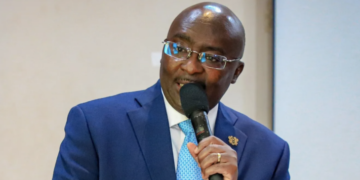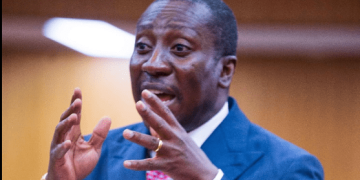The Africa Prosperity Network (APN) and the African Continental Free Trade Area (AfCFTA) Secretariat have unveiled a bold Infrastructure Compact in a historic move to accelerate Africa’s economic integration.
A key highlight of the initiative is the launch of a $1-a-day infrastructure fund aimed at mobilizing 100 million Africans to finance critical transport, energy, and digital projects that will drive intra-African trade and economic transformation.
The Infrastructure Compact was officially presented during the 2025 Africa Prosperity Dialogues (APD), held in Accra, Ghana, from January 30 to February 1.
The high-level summit brought together African presidents, policymakers, business leaders, and trade experts to address infrastructure challenges and fast-track the full implementation of the AfCFTA.
The proposed Integrated Africa Infrastructure Growth Fund is set to revolutionize how the continent finances its connectivity projects.
Under the initiative, Africans—both on the continent and in the diaspora—will be encouraged to contribute as little as $30 a month. The goal is to raise at least $36.5 billion annually, which will be invested in strategic infrastructure projects over the next decade, targeting $2 trillion in total mobilization.
“As Africans, we cannot continue to rely on foreign aid and external borrowing to build the infrastructure that is critical to our future,” said Asare Otchere-Darko, Executive Chairman of APN. “If 100 million Pan-Africanists, including people of African descent and friends of Africa, commit to investing in this fund, we will have the resources to finance our own roads, railways, power grids, and digital systems.”
The Compact outlines five major pillars that will guide Africa’s infrastructure transformation:
- Transport and Logistics Integration: The Compact prioritizes the Single African Air Transport Market (SAATM) and calls for the implementation of the Africa Integrated Maritime Strategy 2050 to lower transport costs, which currently inflate intra-African trade expenses by up to 40%.
- Energy Security and Power Integration: With over 30 African nations struggling with power reliability, the Compact emphasizes interconnected power grids and regional energy policies. It highlights strategic projects like the Grand Inga Dam for hydropower and leveraging the Sahara and Kalahari Deserts for solar energy production.
- Digital Transformation: The plan calls for full adoption of the Pan-African Payment and Settlement System (PAPSS) by 2027 to enable seamless cross-border mobile transactions. It also sets a 2030 target for universal mobile money interoperability across all African Union (AU) regional blocs.
- Healthcare and Social Infrastructure: The Compact urges African governments to invest in local pharmaceutical production and digital health solutions while prioritizing STEAM education (Science, Technology, Engineering, Arts, and Mathematics) to equip young Africans with skills for the AfCFTA era.
- Strategic Infrastructure Financing: Beyond the $1-a-day initiative, the Compact seeks to attract investments from pension funds, insurance companies, sovereign wealth funds, and multilateral financial institutions to drive Africa’s infrastructure expansion.
The Compact received strong backing from African leaders at the APD summit.
Ghana’s President John Dramani Mahama emphasized that the time for action is now.
“The decisions we make at this conference must not end in resolutions alone. We must act with urgency, determination, and a shared vision for prosperity. Let us rise to the occasion, break down the barriers that divide us, and build a strong, self-reliant, and globally competitive Africa,” he said.
Togolese President Faure Gnassingbé and Comoros President Azali Assoumani echoed this sentiment, urging governments to commit to infrastructure financing and fast-track AfCFTA implementation.
AfCFTA Secretary-General Wamkele Mene announced the AfCFTA Transit Guarantee Scheme, set to launch later this year will facilitate smooth cross-border movement of goods and services across Africa.
The summit concluded with the ceremonial lighting of the Africa Trade Torch (ATT), a private-sector-led initiative by the Africa Business Council. The symbolic event underscores Africa’s commitment to mainstream AfCFTA benefits for SMEs, women-led enterprises, and youth entrepreneurs.
Dr. Nkosazana Dlamini Zuma, Chairperson of the APN Advisory Council, emphasized the potential of Ghana’s mobile payment ecosystem as a model for continental financial integration.
With the 38th African Union (AU) Summit scheduled for February 15-16, 2025, in Addis Ababa, Ethiopia, APN plans to push for high-level commitment to the Compact’s objectives.
Siding Eltoum, APN’s Chief Executive Officer, hailed the annual APD as a game-changer, stating:
“The Africa Prosperity Dialogues bring together Africans to craft practical solutions for the continent’s challenges. This Compact is not just another policy document—it is a call to action for all Africans to take ownership of our development.”
As Africa moves towards the AU Agenda 2063 vision of “The Africa We Want,” the Infrastructure Compact marks a major step toward economic self-reliance. With the $1-a-day fund, bold policy reforms, and strong political will, the continent is positioning itself to become the world’s largest and most dynamic single market.



















































































